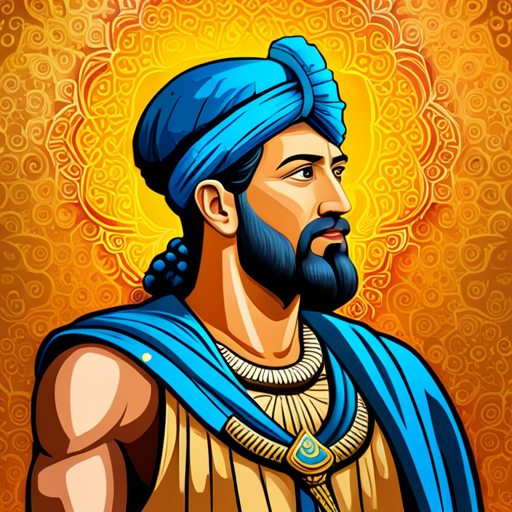Autobiography of Cyrus the Great
Introduction
Greetings to you, my future reader. I am Cyrus II, known to many as Cyrus the Great, the founder of the First Persian Empire, more commonly referred to as the Achaemenid Empire. Born into the house of the Achaemenids around 600 BCE, I spent my life expanding the empire’s territories, establishing what came to be known as the largest empire the world had seen up until that time.
Childhood and Early Life
Born in the harsh landscapes of Persis (modern-day Iran), I am told my birth was a prophecy foreseen, that I was destined to overthrow my grandfather, Astyages, the king of the Medes. Fearing the prophecy, he ordered my death. However, his courtier Harpagus, who was entrusted with this grim task, couldn’t bear to kill an innocent child. So, I was raised by a shepherd and his wife, who nourished and educated me as their own.
During my early years, I was oblivious to my noble heritage. However, my conduct, behavior, and innate leadership qualities soon became a matter of curiosity. Astyages discovered my existence and, despite his initial fear, allowed me to live, recognizing that I was his blood.
Rise to Power
My rise to power was nothing short of a legend. It began with leading a rebellion against my tyrannical grandfather. I, a mere prince of a small vassal kingdom, dared to dream beyond the oppressive walls erected by the Median Empire. The strength of my vision and the righteousness of my cause propelled my men and me forward, leading us to victory over Astyages in 550 BCE.
With the fall of the Medes, I adopted a practice that would become a cornerstone of my rule – tolerance. I allowed the Median Kingdom to retain their culture and traditions, integrating them within the folds of my budding empire. This was a stark contrast to the practices of my predecessors who would often impose their own culture upon those they conquered.
Expansion of the Empire
After assuming control over the Medes, I set my sights on the rich city of Lydia in Asia Minor, ruled by the wealthy king Croesus. Despite his wealth, he could not match the strategy and might of my forces. The fall of Lydia in 547 BCE marked a significant expansion of my empire, bringing the Greeks living in Asia Minor under Persian control.
Babylonia, the greatest city of the ancient world, was my next target. I seized it in 539 BCE without a significant battle or destruction. Here, again, I demonstrated my policy of tolerance. I allowed the Babylonians to continue practicing their religion and freed the Jewish people who had been held captive by the Babylonian king, earning their respect and gratitude. The “Cyrus Cylinder”, considered the ancient world’s first charter of human rights, speaks of these deeds.
Death and Legacy
I met my end in battle around 530 BCE, fighting against a nomadic tribe in the northeastern boundaries of my empire. The empire I had built was handed over to my son, Cambyses II, who continued to expand it.
My legacy, however, was much more than the vast territories of the Achaemenid Empire. I am remembered as a just and merciful ruler, who respected the customs and religions of the lands I conquered. I demonstrated that an empire could be ruled through tolerance and respect for diversity, a principle that resonates to this day.
My story has inspired leaders across ages and continents, from Alexander the Great, who regarded me as his hero, to Thomas Jefferson, who kept two copies of Xenophon’s “Cyropaedia”, a partly fictional biography of me, as a guide for leadership.
Conclusion
As I pen these last lines, I hope my life serves as a testament to the power of tolerance, respect, and just rule. More than the physical boundaries of the Persian Empire, it is these principles that I wish to be remembered for. For I am Cyrus, not just the conqueror, but also the liberator, the lawgiver, and a king who dared to rule with benevolence over tyranny.
Cyrus the Great Books and Audio Books on Amazon.
Show more +